Archive for September 11th, 2013
Manderson on run 4 weeks
(CNS): The hunt is still on for Marcus Manderson, the 25-year-old inmate who remains on the run some four weeks after he and his father and a third prisoners escaped from Northward prison. Manderson, who is serving a mandatory ten year jail sentence follow his conviction for possession of an unlicensed firearm, has managed to avoid being recaptured since the 14 August escape. His father, 44-year-old Steve Manderson, who is serving a life sentence for murder and who has now escaped six times, was recaptured almost two weeks ago and is facing charges of escaping lawful custody.
Both he and the third man in the jail break,Chadwick Dale (22), are being held in Northward’s high security unit, having been reclassified as higher risk prisoners. Dale, who is a Jamaican national, has already been charged over the breakout and appeared in court Tuesday. He is serving a six year sentence in connection with a violent robbery.
Manderson has now been on the run alone for almost two weeks following the capture of his father in the Frank Sound area on 28 August. Dale was the first to be apprehended in the Rum Point area on 20 August.
When they were captured, investigating officers said it appeared that the men had been living rough while on the run. However, as Manderson is now alone, it is becoming increasingly likely the fugitive has left the jurisdiction. Nevertheless, the police said the investigation remains very much active, as both the RCIPS and the prison service continue to follow up leads.
Anyone who wishes to report any suspicious activity relating to the remaining escapee is asked to call 911 or any police station.

September is Childhood Cancer Month
You have heard of the pink ribbon? Of course you have. Cayman will be a sea of pink in October, there will be gala dinners, events to raise awareness and to collect money. Our daughter Hannah will almost certainly not live long enough to have breasts, let alone have any chance of getting breast cancer. She will be six this month and has a less than 5% chance of living three years. (We say that to keep our sanity; the reality is more gloomy and this is likely to be her last birthday.)
She also has cancer, but it is a childhood brain cancer. Whereas 80% of breast cancer patients will survive, 80% of childhood brain cancer patients will die. Some childhood brain cancers have a 0% chance of survival.
That is just childhood brain cancer. There are many other childhood cancers such as various leukaemia's, neuroblastoma, Ewing's sarcoma and Wilm's tumour, and others. They are very different from adult cancers, and the risk factor for children's cancer is simply being a child, not lifestyle. Although their cancers are different, children have to make do with old drugs developed for adults which do them tremendous damage. Two thirds of kids who survive are left with disabilities and a high risk of secondary cancers later in life. The pharmaceutical companies contribute about 0% to childhood cancer research, but 60% to adult cancer research. The US government contributes only 4% of the National Cancer Institute funds to childhood cancer. Kids can't vote. Kids have no voice.
You probably do not know that September is Childhood Cancer Awareness Month and the colour is gold. You can be excused for not knowing because no local news media has mentioned it, nor has the Cayman Islands Cancer Society. However, if you walk around Camana Bay at night it is gold as a result of efforts of friends on behalf of Hannah. Adults owe it to children to stand up for them and protect them and be their voice. In the cancer world this simply does not happen and is a shame on our society. People would like to pretend children do not get cancer, or only other people's children get cancer.
Hannah is not the only child in the Cayman Islands to have cancer. There are others we know have fought and won, others have fought and lost the battle, there others battling now. It affects 1 in 300 children and there are 12,500 children in the Cayman Islands aged 0-19. In a small society such as ours you will already know someone whose child has or has had cancer, or if not you probably will do in the future.
The difference between adult and children's cancers is stark:
– The average age of diagnosis for an adult is 67, and the average life years lost 15.
– The average age of diagnosis for a child is 6, and the average life years lost is 71.
"Curing childhood cancer is the equivalent of curing breast cancer in terms of productive life years saved." Dr Eugene Kleinerman, head of paediatrics at the Children's Cancer Center at MD Anderson Cancer Center.
Yet for every research dollar spent on breast cancer, childhood cancer received only 30 cents.
A child will be diagnosed with cancer every 3 minutes. It is the leading cause of death by disease in the developed world, killing more children under 15 than diabetes, aids, asthma, cystic fibrosis and congenital abnormalities combined.
"You may choose to look the other way but you can never again say you did not know." William Wilberforce.
Please help raise awareness in the Cayman Islands and go gold for September.
Gaylene and I will be shaving our heads in September to raise money for research for all childhood cancers and we will be joined by others. The event will be at the Wicket Bar, Cricket Square on Friday 20 September, from 5-7pm. Please come and show your support.
We are on Facebook and our fundraising page is here — click on the "donate" button.
Please go gold and spread the truth about childhood cancer because Awareness = Funding = Cures!
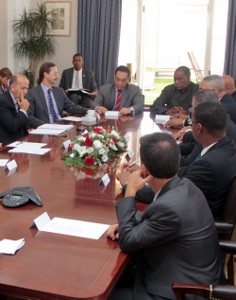
OT leaders find common ground in Gibraltar
 (CNS): The Cayman Islands premier has said that the eight government leaders from the overseas territories that met in Gibraltar this week found many ways to work together to arrive at a consensus ahead of the annual Joint Ministerial Council Meeting of the Overseas Territories in London in November. The focus of this year's meeting with the UK and its territories will be on the jobs and growth. “With discussions on economic diversification, employment, promoting investment, and vocational training, I am confident that this year's JMC meeting will be a very informative and timely one,” Alden McLaughlin said, as he left the Mediterranean territory Wednesday.
(CNS): The Cayman Islands premier has said that the eight government leaders from the overseas territories that met in Gibraltar this week found many ways to work together to arrive at a consensus ahead of the annual Joint Ministerial Council Meeting of the Overseas Territories in London in November. The focus of this year's meeting with the UK and its territories will be on the jobs and growth. “With discussions on economic diversification, employment, promoting investment, and vocational training, I am confident that this year's JMC meeting will be a very informative and timely one,” Alden McLaughlin said, as he left the Mediterranean territory Wednesday.
“If the calibre of the discussions in Gibraltar were any indication, I am certain that the JMC will be a very productive meeting, and will provide an ideal forum for the Overseas Territories to work with the Foreign and Commonwealth Office to agree on action items and make commitments for our continued partnership in promoting the Cayman Islands and the other overseas territories," the premier added.
McLaughlin was joined by his JMC "Sherpa", Jennifer Ahearn, the chief officer from the health ministry, for the three day Pre-JMC meeting, which he said provided an excellent opportunity for him to meet counterparts in the OTs and discuss the unique OT issues.
"This Pre-JMC meeting provided a great forum to explore how we can work together collectively to better address some of these issues when we attend the JMC meeting in November," he said, adding that the solidarity he felt between the OT leaders was gratifying. McLaughlin described a renewed appreciation of the importance of building and maintaining relationships with his counterparts in the other overseas territories.
"While the eight overseas territories are diverse and have their own unique challenges, our discussions in Gibraltar this week were about the many areas in which we can work together, with a view to arriving at a consensus on the way forward that will strengthen our collective position," he said.
Both he and Ahearn left Gibraltar Wednesday for London, where the chief officer in her Sherpa role will attend a one-day meeting at the Foreign and Commonwealth Office to discuss the progress on the commitments from the 2012 JMC Communique, agree the priority items for this year's meeting, and confirm the agenda. The day will also include sessions on three key issues: Jobs and Growth, Health, and Criminal Justice.
Meanwhile, the premier will be joined by Financial Services Minister Wayne Panton and counsellor Roy McTaggart, who will all head to Jersey to meet with several key players in Jersey's financial services sector.
"Visiting Jersey will provide the Cayman Islands with an opportunity to learn more about the successes and challenges that Jersey has faced in many areas, with a particular focus on financial services,” the premier said.
The men also have meetings with the chief minister, the minister for treasury and resources, and the minister for economic development, as well as the bailiff, the lieutenant governor, and representatives from Jersey Finance Limited
McLaughlin said the trip would allow government to develop the relationship with Jersey, which, like Cayman, is recognised as a leader in the financial services industry.
The Joint Ministerial Council Meeting will be in London during the week of 25 November.

New guidelines ratified for early childhood care
(CNS): As part of the goal to improve the quality of care for pre-school kids the Education Council has ratified the Guidelines for Early Childhood Care and Education Centres (2013). The Guidelines contain information on the registration and re-registration processes for centres and the policies and practices required in the operation of Early Childhood Care and Education (ECCE) Centres. The Guidelines build on previous regulatory work by early childhood professionals, inclusive of the Caribbean Community (CARICOM) Regional Guidelines and international best practice as well as the pioneering work of Marjorie Beckles.
Prior to these Guidelines being developed, ECCE centres were governed under guidelines which were published in 2002.
“Caring for our young children is an amazing responsibility. We must ensure that they are protected and stimulated,” said the Education, Employment and Gender Affairs, consellor Winston Connolly as he stood in as temporary minister recently. He added that the guidelines were essential tools in ensuring a high standard of care for each child in the early childhood centres.
“Parents and Centre owners can now also be reassured that they are all being inspected and registered and re-registered using clear and transparent processes. I trust the Early Childhood Care and Education Unit to work alongside each centre to help them meet and exceed these requirements,” he said.
Beckles who was a pioneer in early childhood issues in the Cayman Islands was described as being “years ahead of her time,” Carol Bennett, Senior Policy Advisor and Manager of the Early Childhood Care and Education Unit explained that her input had informed the guidelines along with international best practice which speaks to adult to child ratio and space requirements for children in early childhood centres
The 2013 Guidelines provide information to prospective early childhood centre owners regarding the process to register an early childhood centre with the Education Council. They also outline the re-registration process for ECCE centres that are already in operation. Information about care and education provision, premises and facilities, health and safety and leadership and management are included in the document to ensure all stakeholders in early childhood education are aware of the process and expectations of managing and maintaining high standards of provision for the children they are responsible for.
Representatives from Public Health, Department of Environmental Health, Trade and Business Licensing, Fire Services, Education Quality Assurance Unit, Department of Children and Family Services and the Planning Department were involved in developing the registration and re-registration processes.
Officials said Information from each agency is compiled in the Guidelines so that all stakeholders can be aware of standards and expectations for the centres. Owners and managers of the ECCE centres may use the sample forms and policies in the document, as templates for developing the requirements for their centres.
The Acting Chief Officer for Education, Employment and Gender Affairs. Christen Suckoo recently said there were exciting times are ahead for early childhood in the Cayman Islands. “We look forward to the positive thrust these Guidelines will give us in ensuring all our children are equally provided for and that their health and wellbeing are protected,” he said.
Current Centre operators and principals of government schools with reception programmes will be invited to the launch of the revised guidelines, where they will be explained as well as the process for re-registration that will resume in the near future.
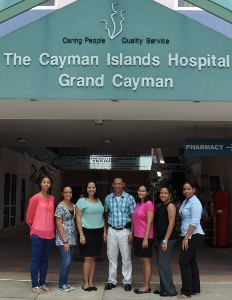
Medical hopefuls spend summer at local hospital
 (CNS): The Cayman Islands Health Services Authority (HSA) gave twelve young people studying medicine some hands on experience this summer with its programme for university students pursuing medical and nursing careers. The students spent rotations of two week periods throughout clinical areas where they gained valuable information the HSA nursing and medical staff. Students ‘shadowed’ various medical professionals allowing them to observe real-life situations. In addition, they also received more formal training, such as Advanced Cardiovascular Life Support (ACLS) and other basic medical skills.
(CNS): The Cayman Islands Health Services Authority (HSA) gave twelve young people studying medicine some hands on experience this summer with its programme for university students pursuing medical and nursing careers. The students spent rotations of two week periods throughout clinical areas where they gained valuable information the HSA nursing and medical staff. Students ‘shadowed’ various medical professionals allowing them to observe real-life situations. In addition, they also received more formal training, such as Advanced Cardiovascular Life Support (ACLS) and other basic medical skills.
Health Services Authority CEO, Lizzette Yearwood, was grateful for the support and sponsorship from the private sector.
“By providing this experience and knowledge during their university years, students are exposed to the many opportunities that are available in the healthcare industry,” the hospital boss said. “It is a priority at the HSA to encourage young Caymanians to enter the healthcare field and to educate students about the opportunities here in Cayman. This year’s programme would not have been possible without the support of our valued private sector sponsors, and we thankthem very much for their support.”
The programme was sponsored by Admiral Administration, Health City Cayman Islands and Lee’s Office Products. Chester Frederick, General Manager at Lee’s stated: “The student summer programme is a unique opportunity to encourage young people to pursue a career in healthcare. We are proud to be a part of a programme that provides a positive environment for the future of Cayman.”
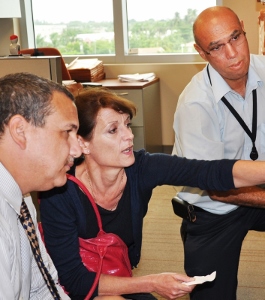
Governor gets down to work on new job
(CNS):  Helen Kilpatrick was doing the rounds of the government building on Monday getting to know the people she will be working with over the next three years, as well as getting a glimpse of the work that needs to be done. On Tuesday she chaired her first Cabinet meeting with Acting Premier Moses Kirkconnell just weeks ahead of the delivery of the 2013 fiscal year’s full budget. With years of government finance experience behind her, Kilpatrick is expected to take an active part in helping the government sort out the public sector finances. During the tour on Monday with Deputy Governor Franz Manderson, she visited ministries, portfolios and some departments in the Government Administration Building.
Helen Kilpatrick was doing the rounds of the government building on Monday getting to know the people she will be working with over the next three years, as well as getting a glimpse of the work that needs to be done. On Tuesday she chaired her first Cabinet meeting with Acting Premier Moses Kirkconnell just weeks ahead of the delivery of the 2013 fiscal year’s full budget. With years of government finance experience behind her, Kilpatrick is expected to take an active part in helping the government sort out the public sector finances. During the tour on Monday with Deputy Governor Franz Manderson, she visited ministries, portfolios and some departments in the Government Administration Building.
Speaking with minsters, chief officers and line staff, she touched on topics ranging from aerial mapping and planning processes, to electronic filing systems and education scholarship. The first tour ended with lunch in the staff cafeteria. Below: Kilpatrick chairs first Cabinet meeting.
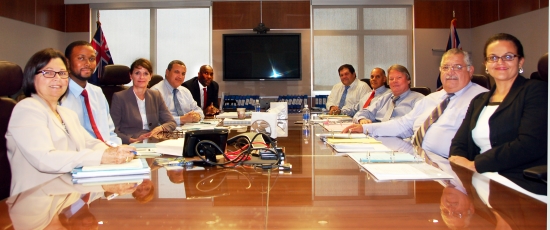
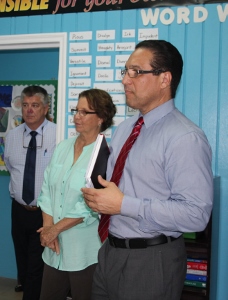
Premier visits seniors and home for troubled youth
 (CNS): As the ministerresponsible for community affairs, Premier Alden McLaughlin called on residents at the Golden Age Home and also visited four young men who are currently resident at the Bonaventure Home for Boys, both in West Bay. Bonaventure, which was founded in 1974, was the first major service project of the Grand Cayman Rotary Club. The premier’s father, Alden McNee McLaughlin Sr, was one of the members of the club who came up with the idea to build a home to provides secure accommodation and rehabilitation for young boys risk between 13 and 18. Managed by the Children and Youth Services Foundation, a government owned company, the home provides programmes of rehabilitation; education and social development skills for young offenders.
(CNS): As the ministerresponsible for community affairs, Premier Alden McLaughlin called on residents at the Golden Age Home and also visited four young men who are currently resident at the Bonaventure Home for Boys, both in West Bay. Bonaventure, which was founded in 1974, was the first major service project of the Grand Cayman Rotary Club. The premier’s father, Alden McNee McLaughlin Sr, was one of the members of the club who came up with the idea to build a home to provides secure accommodation and rehabilitation for young boys risk between 13 and 18. Managed by the Children and Youth Services Foundation, a government owned company, the home provides programmes of rehabilitation; education and social development skills for young offenders.
The boys are sentenced via the court through the Department of Children and Family Services. A Therapeutic Community Programme has been in place at the home for more than a year and represents the adoption of principles that focus on rehabilitation rather than punishment, encouraging young people to dig deep and confront their issues, typically within a peer-group setting. Instead of punishment, they learn the logical consequences of their actions.
The BBH underwent renovations to reflect the philosophy. There is an open dorm layout for staff observation and safety, classrooms, and a group meeting room. Residents have a daily schedule consisting of education, group counseling, individual counseling, meals, recreation, dorm cleaning, and check-ins.
Boys must achieve goals in six separate levels before being allowed to re-enter the lives of their families and schools on a full-time basis. Achievement of each level can take weeks to months. The programme can cater up to 10 boys; currently there are four, with each of them achieving at different levels.
At the Golden Age Home in West Bay, the premier met with clients and staff, where some have worked for 20 years or more. “It takes special people to do this type of work to get someone to stay that length of time,” McLaughlin said. “Someone is doing something right.”
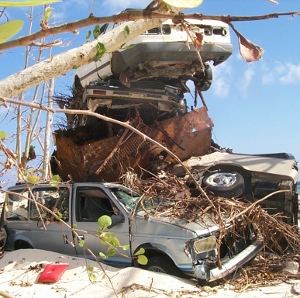
Ivan anniversary serves as reminder to be prepared
 (CNS): With just a small craft warning in place due to rainy weather and two tropical storms out in the Atlantic Wednesday morning, Cayman was remembering very differentweather conditions nine years ago on the anniversary of its worst ever hurricane on record. Hurricane Ivan struck Grand Cayman on the 11/12 September 2004 causing an estimated $3billion of damage and has become something of a watershed in the islands’ history. Although those who remained here during and after the storm went through tough times for several weeks unlike many places around the world hit by natural disaster Cayman recovered rapidly.
(CNS): With just a small craft warning in place due to rainy weather and two tropical storms out in the Atlantic Wednesday morning, Cayman was remembering very differentweather conditions nine years ago on the anniversary of its worst ever hurricane on record. Hurricane Ivan struck Grand Cayman on the 11/12 September 2004 causing an estimated $3billion of damage and has become something of a watershed in the islands’ history. Although those who remained here during and after the storm went through tough times for several weeks unlike many places around the world hit by natural disaster Cayman recovered rapidly.
However, the shock and devastation and the changes brought by Ivan serve as a continued reminder that Cayman is always vulnerable to storms especially this time of year.
“We now are in the most active month for hurricane activity,” said Deputy Premier Moses Kirkconnell. “Hurricane Ivan taught us to not be complacent and to always be prepared. If you will recall, we all thought the Sister Islands were going to get the damage from Ivan, but they were spared; that time.”
The hurricane came closest to the Island around 7am on Sunday 12 September some 21 miles southwest of Grand Cayman packing winds of 150mph with significantly higher gusts, weather experts have said, of more than 200mph. The storm extended some 350 miles across and it took more than 24 hours to pass.
However, despite the incredible destruction and the weeks without power and water following the hurricane the financial sector was up and running within a week or so and just two months later Cayman was welcoming cruise ships and overnight guests returned well before Christmas. The reconstruction following Ivan saw millions injected into the local economy and development surged as the islands were awash in insurance pay outs. Many thousands of new workers were brought to the island to help in the rebuild and many local businesses were formed to meet the insatiable demand it created.
The post Ivan economy boom however began to fade just in time for the world economic crash when the seeds for many of the economic and social woes the country is suffering now were sown. Caymanians began to lose jobs, people left, businesses began to fold and thousands of rebuilt condos stood empty.
The storm taught many lessons, the deputy premeir stated in his remarks about the storm this week, but there are many who believe not all of those lessons were learned.
“Hurricane Ivan was a terrible blow to Grand Cayman, but we learned many lessons from that storm,” said Kirkconnell. “The most important thing we learned is that we have to be prepared at all times for any kind of a disaster. If you don’t have a hurricane plan for your home or business, please put one in place.”
Residents should also ensure they have plenty of up-to-date hurricane supplies, including tinned food, prescription medications and fresh water. People are also urged to know where the nearest shelter is and decide whether they need to evacuate if a storm is coming.
For a full listing of things needed to survive a hurricane, visit www.caymanprepared.gov.ky
For details on current local weather conditions visit www.weather.gov.ky and for tropical weather information visit www.nhc.noaa.gov